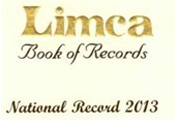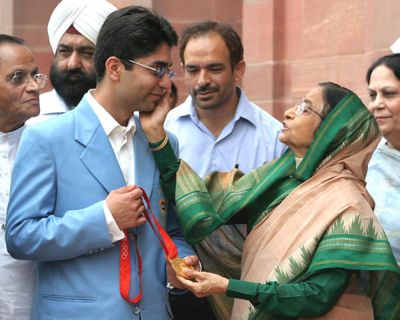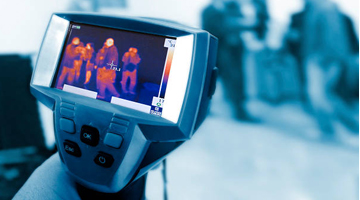 TIOL-DDT 2158 TIOL-DDT 2158
29.07.2013
Monday

ABHINAV Bindra is the first person in the history of independent India to have won the Olympic Gold Medal.In 2008, when he brought the First individual gold for India, the whole of India was elated and the picture shows the then President of India stroking his cheek like an affectionate grandma.
For winning that Olympic Gold, he received an amount of Rs. 4,81,63,380/- from governments, local authorities, Trusts, corporates and individuals.
The Income Tax department is not impressed with Olympic gold - you can't play games with Income Tax - they want their tax.
Abhinav Bhindra as an assessee told the AO that the entire sum of Rs.4,81,63,380/- is not income for which he relied upon the CBDT vide Circular No.447 dated 22nd January, 1986. The Assessing Officer treated this Circular to be inapplicable because of amendment in Section 10(17A) and insertion of Section 56(2)(v). However, he accepted the receipt of reward/prize/gifts from the government, local authorities and trusts/funds recognized under Section 10(23C) or registered under Section 12AA to be exempt. He, therefore, added the sum of Rs.63,10,601/- to be the income of the assessee under Section 56(2)(v).
He is a sportsman and not one to give up easily. On appeal, the CIT(A) enhanced the income by the sum of Rs.2,34,00,000/- being the awards/rewards received from various governments.
He made a second appeal to the ITAT.
The CBDT Circular clarified that awards in the cases of a sportsman, who is not a professional, will not be liable to tax in his hands as it would not be in the nature of income.
In the ITAT, the DR argued that the CBDT Circular relied on by the assessee is dated 22nd January 1986. Much water has flown thereafter. The assessee pleads that the Circular has not been withdrawn and the DR does not rebut. So the Tribunal proceeded with the belief that the Circular was not withdrawn.
In a landmark order delivered on Friday, the ITAT held,
"Shri Abhinav Bindra is the first person in the history of independent India to have won the Olympic Gold Medal. In a country whose population is more than 100 crores, if a sportsman who is not a professional sportsman has won the gold medal for the first time after 60 years of independence of the country and he has been given the awards/rewards/prizes mainly by various governments, local authorities, trusts and institutions and of course some corporate/individuals, a liberal construction of Circular No.447 is required. Considering the facts of the case and the nature and spirit of Circular No.447, we hold that in the case of the assessee, viz., Shri Abhinav Bindra, all the rewards/prizes/gifts received by him are covered by Circular No.447 dated 22nd January, 1986 and, therefore, should not be treated as income in his hands. Accordingly, the addition of Rs.63,10,601/- made by the Assessing Officer and the enhancement of Rs.2,34,00,000/- made by the learned CIT(A) is deleted."
Let us hope, the Income Tax Department does not take the case to the High Court.
Please see 2013-TIOL- 656-ITAT-DEL
ST - Works Contract Service prior to 1.6.2007 - CESTAT Order
THE issue is very simple - Works contracts are composite contracts which involve neither pure sale nor pure service. Because of the uniqueness of these transactions, service of “Works Contract” has been defined as a separate taxable service under clause (zzzza) of sub-section (105) of Section 65 of the Finance Act, 1994 with effect from 01.06.2007. Therefore, the statutory provisions for levy of service tax exist only with effect from 01.06.2007.
But the Department wants to tax this service even prior to 1.6.2007 and litigation is continuing in all possible forums, the latest being the Mumbai CESTAT.
As reported by DDT on Friday, there was difference of opinion between the two Members and the matter is referred to the Third Member.
While the Technical Member had no doubt that a composite works contract can be vivisected and the discernible service element can be subjected to levy of service tax , the Judicial Member held that levy of service tax on works-contract or lump-sum turnkey contract under the provisions of section 65(39a) prior to 01.06.2007 is impermissible as no valid charge have been created.
We promised to bring you this order as soon as possible. We do it today.
Please see Breaking News.
Validity of IEC for EOU or units in SEZ/EHTP/STP/BTP after de-bonding
UNDER Policy Circular No.26 dated 11.8.2008, at the time of de-bonding and converting to DTA unit, a 100% EOU surrenders its IEC to the Development Commissioner concerned of Special Economic Zone (from where it obtained IEC) for cancellation. Thereafter, the firm approaches the RA concerned for issue of a fresh IEC against the same PAN Number. On the other hand, when a DTA unit converts into a 100% EOU unit, its IEC issued by RA continues to remain valid.
The issue has been reviewed by the DGFT and it is felt that the existing arrangement can be improved to reduce transaction cost. Accordingly, it has been decided that an IEC will remain valid irrespective of a firm's status as a DTA unit or an EOU or a SEZ/ EHTP/STP/BTP unit and the procedure to be followed in case a firm/unit is de-bonded and converted to DTA is as under:
a. A unit, which is in EOU or in SEZ/EHTP/STP/BTP after de-bonding will not surrender the IEC obtained from its jurisdictional DC, SEZ.
b. The jurisdictional DC, SEZ will send the original IEC file to concerned RA of DGFT after de-boding.
c. RA becomes the custodian of such file and will allow de-bonded unit to make necessary modification in IEC.
d. The de-bonded unit to be eligible for benefits from the RA as per FTP.
DGFT Circular No. 2/(RE-2013)/2009-14,Dated: July 26, 2013
Legal Metrology (Packaged Commodities) Rules, 2011 amended - S. 4A of CEA, 1944 in turmoil?
LEGAL Metrology (Packaged Commodities) Rules, 2011 have been amended by Notification No. GSR 359(E) dated 06.06.2013 issued by the Ministry of Consumer Affairs, Food and Public Distribution (Department of Consumer Affairs), New Delhi.
The definition of the terms ‘industrial consumer' & ‘institutional consumer' have been independently notified as separate rules 2(bb) and 2(bc). Earlier they were appearing as Explanation (ii) and (i) to Rule 3 of the Rules. The result of this amendment would be that these definitions would now be applicable to the entire Packaged Commodities Rules instead of being restricted to Rule 3.
The definition of ‘retail package' contained in rule 2(k) now omits the proviso clause meaning to say that a ‘retail package' would now include an ‘industrial' as well as an ‘institutional consumer' as the ultimate consumer.
The above changes have come in to effect from 06.06.2013.
Synopsis of the changes in tabular format :
|
Sl. No.
|
Particulars
|
Definition prior to 06.06.2013
|
Definition on and from
06.06.2013
|
|
1
|
Industrial consumer -
Insertion of new rule 2(bb)
|
Contained in Explanation (ii) to Rule 3 -
“industrial Consumer” means the industrial consumer who buy packaged commodities directly from the manufacturer for use by that industry
|
“industrial consumer” means
the consumer who buys packaged commodities directly from the manufacturer for use by that industry;
|
|
2
|
‘institutional consumer' - insertion of new rule 2(bc)
|
Contained in Explanation (i) to Rule 3 earlier -
“institutional consumer” means the institutional consumer like transportation, Airways, Railways, Hotels, Hospitals or any other service institutions who buy packaged commodities directly from the manufacturer for use by that institution.
|
“Institutional consumer” means any institution which hires or avails of the facilities or service in connection with transport, hotels, hospitals or such other service institutions which buy packaged commodities directly from the manufacturer for use by that institution;
|
|
3
|
Rule 2(k)
|
“Retail package” means the packages which are intended for retail sale to the ultimate consumer for the purpose of consumption of the commodity contained therein and includes the imported packages:
Provided that for the purpose of this clause, the expression ‘ultimate consumer' shall not include industrial or institutional consumers;
|
Proviso to clause omitted.
|
Hopefully, with these changes, Section 4A of the Central Excise Act, 1944 prescribing MRP based valuation for Notified goods would breathe easy or is it going to be in turmoil.
But is the CBEC aware of these changes and will it issue any clarification on the implications thereof?
Notification No. GSR 359(E) dated 06.06.2013 [Ministry of Consumer Affairs, Food and Public Distribution (Department of Consumer Affairs), New Delhi]
ST - Appellant is only a matriculate and does not hold any professional degree in Engineering, recognized by law - Therefore, appellant does not qualify as "Consulting Engineer" as defined in FA, 1994
Sh. Nagindas Jamnadas Vora obtained a patent bearing no. 187148 of 08/01/1998 for a new compact oil cooler which was allowed to be used by Vora Exclusive Tools Pvt. Ltd., for which he was entitled to receive royalty.
The department was of the view that the appellant is liable to pay service tax on the royalty received amounting to Rs.5,96,620/- during the year 2000-01 to 2001-02 along with interest thereon under “Consulting Engineer's Service”.
The adjudicating authority confirmed the demand along with interest and penalty and the lower appellate authority ‘mechanically confirmed' the demand and rejected the appeal without taking cognizance of the plea of the appellant that he was only a matriculate and was not a qualified engineer to come under “Consulting Engineer's Service”.
Before the CESTAT the appellant adverted to the definitions of ‘Consulting Engineer' given in clause 65(31) of the FA, 1994 and the definition of what constitutes Taxable service as per section 65(105)(g) of the FA, 1994. It was also pointed out that the transfer of right to use the patent falls under "Intellectual Property Service", which came under the tax net with effect 10/09/2004 and during the impugned period the said service was not taxable. Therefore, the impugned order is not sustainable in law and the appeal be allowed.
The Revenue representative chose not to budge from the stand taken by the lower authorities.
The Bench observed -
"6. We have considered the submissions made by both the sides. It is an undisputed fact that the appellant is only a matriculate and does not hold any professional degree in Engineering, recognized by law. Therefore, the appellant does not qualify as a “Consulting Engineer” as defined in law. Secondly, the appellant was a patentee and transferred the right to use the patent to his client for consideration of royalty payment. The said service merits classification under “Intellectual Property Service' which came into tax net with effect from 10/09/2004. Since the period in dispute is much prior to that, there is no service tax taxability with respect to the services rendered by him."
Holding that the order was not sustainable in law the same was set aside and the appeal was allowed.
See 2013-TIOL-1136-CESTAT-MUM
Jurisprudentiol - Tuesday's cases
 Central Excise Central Excise
CENVAT Credit taken wrongly, not utilised, but reversed - no interest, no penalty: CESTAT
THE appellants are engaged in manufacture of sugar and were availing the benefit of Cenvat credit of duty paid on various inputs as also on capital goods. However, while availing the Cenvat credit in respect of capital goods, it seems that they availed the credit in respect of those items which according to the Revenue were not capital goods,. The said fact was pointed out by the audit and the appellant accepted the same and reversed the excess availed credit.
The dispute is whether such excess availed credit which was reversed by the assessee, even before utilization, would attract interest and penalty or not.
Income Tax
Whether money kept in escrow account for a specific purpose can be demanded by Revenue u/s 226 to clear income tax liability - NO: Delhi HC
THE issues before the Bench are - Whether money kept in escrow account is available to the assessee or the Revenue, when it is kept specifically to indemnify the purchaser of shares against any income tax liability arising on the assessee; Whether Revenue can invoke the provisions of section 226 to settle its tax demand against such held back amount, although it is clear from the language of the Share Purchase Agreement that under no circumstances would the money held in escrow be released either to the assessee company or to the Department; Whether a company can stake claim to any part of the consideration as shares in a transaction relating to sale and purchase of shares inter-se the selling shareholders and purchasers; Whether when the assessee company is neither a party to the Share Purchase Agreement or the Escrow Agreement can claim any sum from the parties to the Escrow Agreement; Whether as per section 226 of the Income Tax Act, the AO steps into the shoes of an assessee with respect to recovering sums owed to or held by the garnishee on account of the assessee; Whether section 226(3) neither confers jurisdiction nor provides a machinery for an AO to adjudicate the indebtedness of a third party to the assessee; And the assessee's writ allowed.
Service Tax
Applicants are arranging tour of Ranthambore sanctuary by various types of vehicles and collecting certain amounts per person - since they are engaged in business of planning, scheduling, organizing or arranging tours, therefore, prima facie, they are liable to pay ST under category of "Tour operator service" - Pre-deposit ordered: CESTAT
THE appellant in this case are the Deputy Conservator of Forest & Deputy Field Director, Rajasthan. Against them a Service Tax demand of Rs.1.56 Crores has been confirmed by the CCE, Jaipur and, therefore, they are in the urban forest with a Stay application filed before the CESTAT. The service tax demand is made on the ground that the applicant provided tour operator service and had not paid service tax for the period from 1.4.2004 to 31.3.2010. Two show cause notices were issued for demanding duty and for penalty. The adjudicating authority confirmed the demand along with interest. In respect of first SCN, the CCE, Jaipur allowed the benefit of section 80 of Finance Act, 1994 and had not imposed any penalty. However, the same was not the case in the second SCN and penalty under section 76 & 77 was imposed.
See our Columns Tuesday for the judgements
Until Tuesday with more DDT
Have a nice day.
Mail your comments to vijaywrite@taxindiaonline.com |









 Download PDF
Download PDF

 Central Excise
Central Excise



